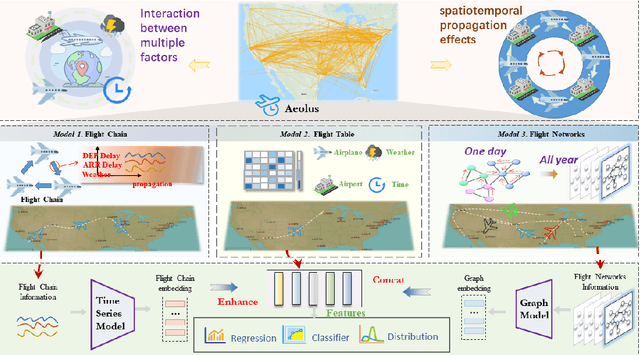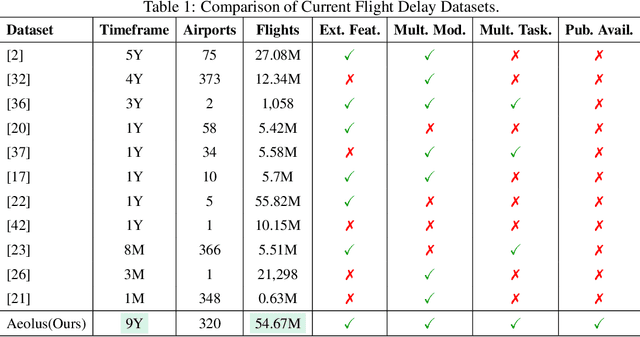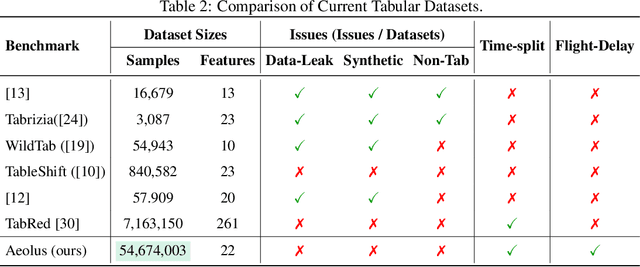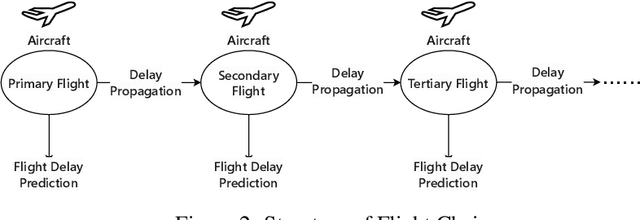Suwan Yin
Aeolus: A Multi-structural Flight Delay Dataset
Oct 30, 2025



Abstract:We introduce Aeolus, a large-scale Multi-modal Flight Delay Dataset designed to advance research on flight delay prediction and support the development of foundation models for tabular data. Existing datasets in this domain are typically limited to flat tabular structures and fail to capture the spatiotemporal dynamics inherent in delay propagation. Aeolus addresses this limitation by providing three aligned modalities: (i) a tabular dataset with rich operational, meteorological, and airportlevel features for over 50 million flights; (ii) a flight chain module that models delay propagation along sequential flight legs, capturing upstream and downstream dependencies; and (iii) a flight network graph that encodes shared aircraft, crew, and airport resource connections, enabling cross-flight relational reasoning. The dataset is carefully constructed with temporal splits, comprehensive features, and strict leakage prevention to support realistic and reproducible machine learning evaluation. Aeolus supports a broad range of tasks, including regression, classification, temporal structure modeling, and graph learning, serving as a unified benchmark across tabular, sequential, and graph modalities. We release baseline experiments and preprocessing tools to facilitate adoption. Aeolus fills a key gap for both domain-specific modeling and general-purpose structured data research.Our source code and data can be accessed at https://github.com/Flnny/Delay-data
Explainable and Safe Reinforcement Learning for Autonomous Air Mobility
Nov 24, 2022Abstract:Increasing traffic demands, higher levels of automation, and communication enhancements provide novel design opportunities for future air traffic controllers (ATCs). This article presents a novel deep reinforcement learning (DRL) controller to aid conflict resolution for autonomous free flight. Although DRL has achieved important advancements in this field, the existing works pay little attention to the explainability and safety issues related to DRL controllers, particularly the safety under adversarial attacks. To address those two issues, we design a fully explainable DRL framework wherein we: 1) decompose the coupled Q value learning model into a safety-awareness and efficiency (reach the target) one; and 2) use information from surrounding intruders as inputs, eliminating the needs of central controllers. In our simulated experiments, we show that by decoupling the safety-awareness and efficiency, we can exceed performance on free flight control tasks while dramatically improving explainability on practical. In addition, the safety Q learning module provides rich information about the safety situation of environments. To study the safety under adversarial attacks, we additionally propose an adversarial attack strategy that can impose both safety-oriented and efficiency-oriented attacks. The adversarial aims to minimize safety/efficiency by only attacking the agent at a few time steps. In the experiments, our attack strategy increases as many collisions as the uniform attack (i.e., attacking at every time step) by only attacking the agent four times less often, which provide insights into the capabilities and restrictions of the DRL in future ATC designs. The source code is publicly available at https://github.com/WLeiiiii/Gym-ATC-Attack-Project.
 Add to Chrome
Add to Chrome Add to Firefox
Add to Firefox Add to Edge
Add to Edge